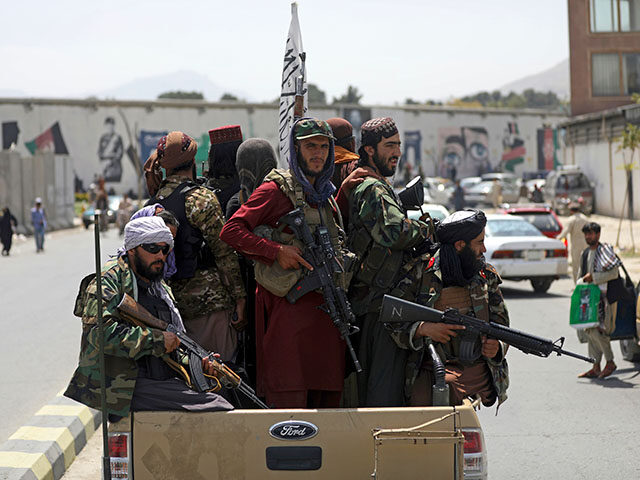The Taliban jihadist regime in Afghanistan sent its Industry and Commerce Minister Nooruddin Azizi to Beijing on Monday to attend this week’s “Belt and Road Forum,” a celebration of ten years of China’s global predatory lending scheme.
The Belt and Road Initiative (BRI) is nominally a program run by the Chinese Communist Party that offers poor nations funding to invest in otherwise unaffordable road, port, and railway projects, allegedly designed to help those countries become more competitive economically and ship their exports more efficiently. China offers funding in the form of high-interest loans with a long list of conditions attached, which later erode the sovereignty of the countries involved.
The Communist Party uses its leverage with its now-heavily indebted partners to increase its geopolitical clout and manipulate the local politics of those countries, as well as exploit their natural resources. In commentary on Monday, the official newspaper of the Chinese Communist Party, the People’s Daily, used the BRI to argue that China is a more worthy global superpower than the United States, claiming, “China does not have the historical burden of Western colonialist powers’ expansion.”
“China remains impartial, refrains from fueling the fire, maintains neutrality and strives for peace. It encourages conflicting parties to escape the cycle of confrontation and conflict,” the state outlet claimed. “This stance aligns with China’s choice and is consistent with the universal concept of human rights.”
China is one of the world’s most prolific human rights abusers, currently engaging in a genocide of its Muslim populations in occupied East Turkistan and for decades engaging in the mass arrests and disappearances of people of faith and political dissidents. Abroad, the BRI has itself been accused of colonialism, particularly in Africa, where locals have documented widespread racist abuse and exploitation by Chinese business operators.
The Taliban is one of dozens of regimes around the world formally partnered with the BRI. China enthusiastically cheered the Taliban’s takeover of Afghanistan in 2021, calling it a “sunny day in Kabul” when then-President Ashraf Ghani fled and allowed the terrorists to overrun the capital. Taliban terror leaders at the time welcomed Chinese investment and influence in the country and, in exchange, offered to support China’s ongoing genocide of Muslims in East Turkistan, on the other side of the Afghan border.
Beijing has consistently urged the world to lift sanctions on the group and praised it for allegedly eradicating corruption and bringing stability to war-torn, impoverished Afghanistan. In reality, the Taliban has imposed a reign of terror on Afghan civilians, engaging in routine human rights abuses against Afghans. The Taliban has been particularly brutal against Afghan women, banning them from being visible in public and depriving them of jobs and education.
In exchange for the Communist Party’s support, the Taliban has welcomed Chinese regime-affiliated businesses into the country, opening the possibility of giving China dominance over Afghanistan’s extensive mineral wealth.
The terrorist organization’s official Bakhtar News Agency confirmed its participation in the “Belt and Road Forum,” scheduled to begin on Tuesday, and published a photo of Azizi’s delegation to Beijing prior to their departure to the event.
WATCH — Rhodes: China Is “Much More” Aggressive with Spying in Preparation for Possible War:
Minister Azizi will also meet with investors and businessmen of China on the sideline of the meeting in that country, said the Ministry on X app.
— BNA English (@bnaenglish) October 16, 2023
Similarly, the Global Times, a Chinese government propaganda outlet, celebrated the Taliban’s participation in the Belt and Road festival, claiming that the jihadists’ presence there proved its worth as “an open and inclusive platform.”
“Taliban’s attendance highlights China’s efforts to provide Afghanistan with a broad platform to get involved in the international community and seek more opportunities to develop its domestic faltering economy and livelihood,” the Times quoted a Chinese regime-approved “expert” as stating. The outlet described the goal of the Taliban’s visit as attempting to bring Chinese and other international investment into the country to build a more formidable road infrastructure and increase the profits of the Afghan mining sector.
The South China Morning Post observed on Monday that the Belt and Road Forum is one of the “highest-profile multilateral summits” to which the Taliban has received an invitation since August 2021. The Times noted that China expects over 130 countries to have some representation at the forum, giving the Taliban an ample audience for potential investors.
WATCH — Exclusive — John Rourke: I’ve Found Chinese, Russian IDs at Biden’s “Wide Open” Southern Border:
Afghanistan is believed to be one of the world’s most naturally mineral resource-rich countries. Experts believe Afghanistan to be home to over $1 trillion worth of rare-earth minerals, indispensable for the manufacturing of high-tech equipment and electric vehicles. While not significantly mineral-rich by nature, China is the dominant power in the manufacture of electric vehicle batteries and the processing of rare-earth minerals, including nearly 70 percent of the world’s lithium, 95 percent of manganese, 73 percent of cobalt, 70 percent of graphite, and 63 percent of nickel.
The Taliban joined the BRI in May, holding a meeting with then-Chinese Foreign Minister Qin Gang before his abrupt and ongoing disappearance to make the partnership official. Beijing celebrated the two-year anniversary of the fall of Kabul by claiming the Taliban is “committed to promoting national peace reconstruction and independent development,” offering no commentary on the long record of human rights abuses the Taliban has tallied during its current rule. Among the alleged achievements Chinese officials credited the Taliban for, contrary to the reality in Afghanistan, were improvements in “economic development, corruption eradication, drug prohibition … and social security.”
In September, China became the first country to formally appoint an ambassador to Kabul, recognizing the legitimacy of the Taliban regime.

COMMENTS
Please let us know if you're having issues with commenting.